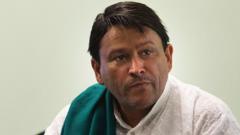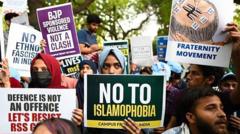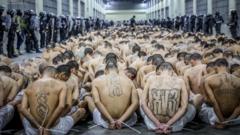Luis Alberto Castillo's family defends him against U.S. government claims as he faces indefinite detention at Guantánamo Bay after migrating to the states for a better future.
**Controversy Surrounds Venezuelan Migrant's Detention in Guantánamo Bay**

**Controversy Surrounds Venezuelan Migrant's Detention in Guantánamo Bay**
Family insists that Luis Alberto Castillo is a victim of discrimination, not a criminal.
Luis Alberto Castillo, a Venezuelan father, arrived in the United States seeking a better life for his son just one day before Donald Trump took office for a second term, marked by a tough stance on undocumented migrants. However, just weeks later, Castillo found himself on a flight to Guantánamo Bay on February 4, 2025, designated as an individual linked to a criminal group known as Tren de Aragua by the Department of Homeland Security.
Castillo's family, particularly his sister Yajaira Castillo, has voiced strong opposition to these characterizations, emphasizing that he fled Venezuela due to its dire economic crisis. During an emotional interview from Colombia, Yajaira labeled the legal actions against her brother as discrimination and xenophobia, contending that he is not a criminal, but rather an ordinary person looking to provide for his family. “This is all discrimination and xenophobia, just because he’s Venezuelan,” she expressed during the conversation.
The situation highlights growing concerns within the migrant community regarding the treatment of Venezuelans in the U.S., particularly following recent policies that categorize migrants based on their origins. Critics argue that targeting individuals from specific backgrounds fosters a harmful narrative that associates them with criminality, further complicating their paths to asylum and integration into American society.
Castillo's family, particularly his sister Yajaira Castillo, has voiced strong opposition to these characterizations, emphasizing that he fled Venezuela due to its dire economic crisis. During an emotional interview from Colombia, Yajaira labeled the legal actions against her brother as discrimination and xenophobia, contending that he is not a criminal, but rather an ordinary person looking to provide for his family. “This is all discrimination and xenophobia, just because he’s Venezuelan,” she expressed during the conversation.
The situation highlights growing concerns within the migrant community regarding the treatment of Venezuelans in the U.S., particularly following recent policies that categorize migrants based on their origins. Critics argue that targeting individuals from specific backgrounds fosters a harmful narrative that associates them with criminality, further complicating their paths to asylum and integration into American society.


















